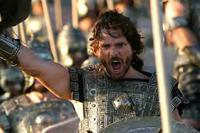
A few months ago, a guy on a writer's forum ripped me to pieces for expressing approval of the soundtrack on this film. He was not a Horner fan. He said his friend wrote the original score and when it tested poorly, Horner was brought in a month or so before the film was released to rewrite the whole thing. Yup. Sour grapes.
Since I didn't own the CD at the time and had only heard the music in the theater, I conceded that my Horner adoration could have influenced my opinion as much as his own devotion to his friend probably skewed his. I have since bought the soundtrack and memorized it beat by beat. I was wrong. The score is perfect.
First of all, I admit that composers write soundtracks that resemble each other and this one is no exception, but that's a diatribe for another blog. This one is an encomium.
About 45 minutes into the Troy CD, Track 8 begins. This track accompanies the Trojans as they attack the Greeks who are without their ringer, Achilles. It opens obscurely, some cellos that grow gradually in intensity as the Trojans creep up on the Greeks at dawn.
Naturally, a battle scene must have pomp so the fanfare begins with the brass arriving in layers representing the Greek troops spilling over a hillside. But close your eyes and it sounds more as if the clouds are being pulled back one layer at a time, throwing open the floodgates as the gods take their places behind their chosen side.
A minute into the track the melody begins. It's a march with the purity of a lullaby. Ten measures later a flurry of strings and woodwinds provide the adrenaline until the arrangement erupts into the full blown battle of overlapping brass.
But for me, the most powerful part of the piece is something Horner masters, his ability to take a single instrument and create a brief solo that creates the emotion the scene demands. In this case, it's a lone trumpet that cries out, piercing through the confusion like a battle cry and hovering high above the battle until it descends like a dying voice.
Suddenly, the timpani take over like a thunderbolt of Zeus. But is it thunder or is it the feet of the gods stomping in the stadium as they watch the missing Achilles suddenly join the battle? No, that pounding echos my own heart beat.
Was this what Edgar Allen Poe felt when he wrote the Tell Tale Heart? The heartbeats raise a terrifying tension as the two greatest warriors in all the Aegean Hector and Achilles, face off. Both armies pause to witness the confrontation of the ages.
The strings warn us that something terrible is about to happen but the heartbeats continue. We want them to stop. The bloodshed has to end. We don't want them to stop. One of our heros will die.
Seventeen heartbeats later, shocked silence. The heartbeats stop. No music. No nothing. Hector has felled the mighty Achilles.
Achilles men are dumbstruck with grief. The music creeps in slowly, mournfully. Hector removes the helmet of the dying hero and then utter incredulity! It is not Achilles as Hector and Achilles' own men believed. This is a young boy, drowning in his own blood and quivering in fear. The dying boy's agony trembles through the music with Hector's own anguish over what he's done. Then a decision. Hector runs his sword through the boy's chest. The boy suffers no more.
There's no dialogue during this battle. Watch the scene without sound and it's interesting. Watch it with the music and it's unbearable.
No comments:
Post a Comment